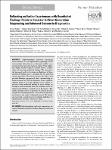Reflecting on Earlier Experiences with Unsolicited Findings: Points to Consider for Next-Generation Sequencing and Informed Consent in Diagnostics
Rigter, Tessel
Henneman, Lidewij
Kristoffersson, Ulf
Hall, Alison
Yntema, Helger G.
Borry, Pascal
Tönnies, Holger
Waisfisz, Quinten
Elting, Mariet W.
Dondorp, Wybo J.
Cornel, Martina C.
High-throughput nucleotide sequencing (often referred to as next-generation sequencing; NGS) is increasingly being chosen as a diagnostic tool for cases of expected but unresolved genetic origin. When exploring a higher number of genetic variants, there is a higher chance of detecting unsolicited findings. The consequential increased need for decisions on disclosure of these unsolicited findings poses a challenge for the informed consent procedure. This article discusses the ethical and practical dilemmas encountered when contemplating informed consent for NGS in diagnostics from a multidisciplinary point of view. By exploring recent similar experiences with unsolicited findings in other settings, an attempt is made to describe what can be learned so far for implementing NGS in standard genetic diagnostics. The article concludes with a set of points to consider in order to guide decision-making on the extent of return of results in relation to the mode of informed consent. We hereby aim to provide a sound basis for developing guidelines for optimizing the informed consent procedure.
No license information

